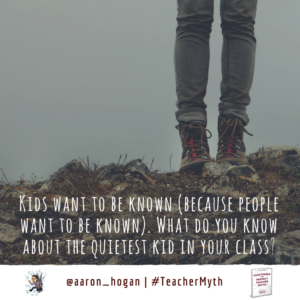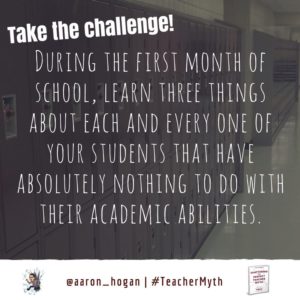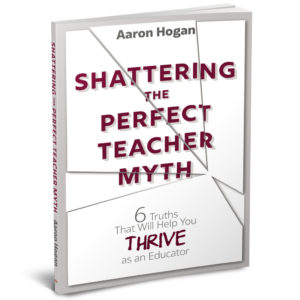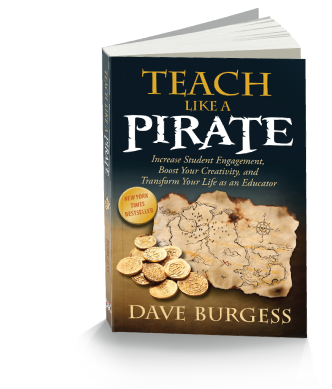As we get ready to head into this coming school year, it is so critical to keep our mightier purpose as educators in the  forefront of our minds. It’s so easy to get distracted and overwhelmed by everything that competes for our attention in the hustle and bustle and sometimes sheer chaos of kicking off a year. That’s why I’m excited to share this post by Aaron Hogan that will help us keep our eyes on the prize…this business is about having a positive long-term impact on students’ lives and on building powerful relationships with kids. We are honored to have published Aaron’s wonderful book, Shattering the Perfect Teacher Myth: 6 Truths That Will Help You Thrive as an Educator. It has already received rave reviews from all corners and has dispelled many of the false beliefs about our profession that hold so many of us back.
forefront of our minds. It’s so easy to get distracted and overwhelmed by everything that competes for our attention in the hustle and bustle and sometimes sheer chaos of kicking off a year. That’s why I’m excited to share this post by Aaron Hogan that will help us keep our eyes on the prize…this business is about having a positive long-term impact on students’ lives and on building powerful relationships with kids. We are honored to have published Aaron’s wonderful book, Shattering the Perfect Teacher Myth: 6 Truths That Will Help You Thrive as an Educator. It has already received rave reviews from all corners and has dispelled many of the false beliefs about our profession that hold so many of us back.
Here is Aaron’s post…and please take on the challenge he throws down at the end!!
What do you want students to remember after their time in your classroom when they leave?
Not at finals.
Not in June when the year is over.
Think further down the road.
Think BIGGER.
You’ve poured your heart into the school year week in and week out (including plenty of weekends and likely even a few personal days off) to grade and provide feedback, create unforgettable experiences for kids, and do everything you can to make school amazing in your classroom. In three or four years, what do you really want them to remember about their time in your classroom that makes it all worth it?
Take a minute and write down your answer. Seriously. Take a few seconds to think about it. What will matter from the time you have invested in your students in 3-4 years? Don’t keep going until you’ve thought about this and written something down.

I’ve really enjoyed asking teachers this question lately. I love hearing what they say about this. It’s still just so encouraging to hear teacher share what they ultimately want their students to have learned. Here’s what some have said:
I want my students to leave with an increased love for learning.
I want my students to leave confident that they have learned how to learn.
I want my students to leave knowing they are readers and they are writers.
I want my students to leave knowing they can change the world.
I could go all day listening to teachers answer this question.
Unfortunately, this perspective can get lost in our day to day work. All educators know we have little choice about many of the constraints that are put on us. I’ve yet to come across a teacher who is asking for a standardized test, a finite budget, only so much time, and a limited amount of energy. And that’s only the start of it. I get it, and I can’t solve that.
What I do know it that those constraints aren’t stopping many amazing educators from still accomplishing their ultimate goals for their students.
Even the elimination of all of those constraints–a world with no standardized tests, all the dollars, all the time, and unlimited energy–would still leave us with the need to address one other issue. It doesn’t cost you anything to solve it other than time, and you do it all during school hours.
When you start in with a lofty goal like “I want my students to leave with an increased love for learning,” the toughest part isn’t getting the majority of your class across it. It’s not getting the ones you naturally connect with there. It’s probably not getting the kid who needs the greatest amount of your time there either. My suspicion is that it is the quiet ones–the one who are nearly invisible in your classroom–who are the toughest. They’re probably compliant, competent, and just under the radar enough that you don’t have to notice them a lot. These kids who seem almost invisible in your classroom, they’re the last ones we connect with.
When I think back to my initial question, my favorite things teachers consistently shared aligned with Maya Angelou’s assertion: “I’ve learned that people will forget what you said, people will forget what you did, but people will never forget how you made them feel.”
Students want to be known. All people do. It’s a little scary to be known sometimes, but we all still have that desire. Ithelps us know that we’re safe, that we’re not alone. When we send students out with a certain feeling about our class, it’s nearly always rooted in how they felt when they were learning with us.
It is our great privilege to serve a great number of students (sometimes more than we think we can even handle), so it is our responsibility to get to know those students.
By no means does that excuse us from those constraints that we mentioned earlier. But what this does do is clarify a purpose for the margin that we do have at school.
Here’s my challenge: During the first month of school, learn three things about each and every one of your students that have absolutely nothing to do with their academic abilities.
that have absolutely nothing to do with their academic abilities.
Spend a little time getting to know each and every student you will serve this year. Yes, it will be easier for some educators than others. But if you have to make a concession, learn less about each student or give yourself more time to pull this off. (Whatever you do, please do not simply opt to just learn about a smaller percentage of your students.)
Think back to the last students you served: What do you know about the quietest kid in the room?
When I ask myself that question, I always knew at least something about the student, but it was always less than I wish I knew. I wish I had done something different.
I’m a big believer in the idea that change comes from action. With that in mind, before you leave this post, do three things for me:
1) Tweet out your answer to the “What do you want students to remember…” question with the #TeacherMyth and #TLAP hashtags. Educators need to see what you really want your students to remember in a few years. (Yes, YOU!)
2) Put a reminder in your phone for the day you go back to school that says, “It’s time to make a plan to learn three things about each student you serve.” (Put another one on October 1st that says, “How much do you know about the quietest kid in class?”)
3) Identify two people on your campus who you can bring into this little project. It’s not always easy to find ways to connect. Don’t plan to go the journey alone.
Most of all, thanks for serving students so faithfully. That’s the work that is truly going to make students remember what matters from their time with you. If you’ve made it this far into this post, my best is that you are the kind of educator who makes an incredible impact on students. That is work that literally changes the world. Thanks so much for giving of yourself to make school amazing for students! Good luck getting to know them all!

Aaron Hogan
Thank you, Aaron!! The challenge has been set!! I hope you enjoyed Aaron’s post and if you did…I know you’ll
absolutely love his new book, Shattering the Perfect Teacher Myth. you can find it right here on Amazon or right here at Barnes & Noble. Let us know if you pick it up and join the conversation at #TeacherMyth!




